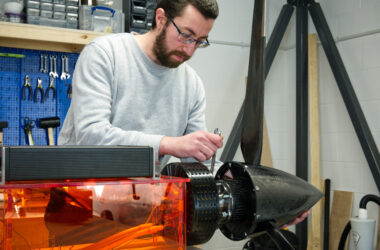The aviation industry stands at a pivotal crossroads. As the world grapples with the pressing need to combat climate change, sustainable solutions have never been more crucial.
Enter green hydrogen – a beacon of hope for an industry striving for sustainability. The University of Sheffield, renowned for its innovative research, is now poised to lead the UK in this green hydrogen revolution.
With its ambitious initiatives and cutting-edge equipment, the University is not only championing the production of green hydrogen but is also driving the development of sustainable aviation fuels, setting the stage for a cleaner and greener future in air travel.
The Green Hydrogen Initiative
The University of Sheffield is not just joining the green hydrogen movement; it’s aiming to lead it. With the installation of new state-of-the-art equipment, the University is set to outpace all other UK research centres in green hydrogen production. This isn’t just about numbers, in any case. This electrolyser is at the forefront of producing clean and sustainable energy by splitting water into hydrogen and oxygen. The implications of the technology are vast, with the potential to revolutionise aviation and various industries, underscoring the University’s vision of a sustainable future.
Sustainable Aviation Fuels Innovation Centre (SAF-IC)
Nestled within the University of Sheffield is the Sustainable Aviation Fuels Innovation Centre (SAF-IC). SAF-IC is the UK’s premier R&D facility equipped to handle the entire lifecycle of new fuels – from development and testing to validation and certification. This holistic approach ensures that the fuels produced meet the stringent standards required for aviation, ensuring safety without compromising sustainability.

With the addition of the new hydrogen electrolyser, SAF-IC is further empowered to delve deep into the potential of hydrogen-based sustainable aviation fuels (SAFs). As the aviation industry grapples with its carbon footprint, SAFs emerge as a vital solution, and SAF-IC is at the helm of this transformative journey.
With its global reach, the aviation industry plays a significant role in global carbon emissions. Accounting for about 7% of the UK’s total carbon emissions, the urgency to decarbonise this sector is palpable. Sustainable aviation fuels (SAFs) present a promising solution to this challenge. By transitioning to SAFs, the industry can significantly reduce its carbon footprint, paving the way for a more sustainable future. However, the path to decarbonisation has its challenges. The industry’s deep reliance on fossil fuels presents challenges requiring innovative solutions.
This is where the University of Sheffield’s research comes into play. By developing new hydrogen and CO2-based fuels that adhere to strict standards, the University is addressing the aviation industry’s immediate needs and assisting other sectors in their quest to switch fuels and decarbonise. The broader impact of these efforts is clear: a world where industries operate sustainably, ensuring a healthier planet for future generations.

The University has forged strong partnerships with industry stalwarts. One such notable collaboration is with Virgin Atlantic, a pioneer in the aviation industry. Together, they are gearing up for a monumental achievement: the world’s first 100% SAF transatlantic flight. Scheduled for later this year, this flight symbolises the potential of sustainable aviation fuels and the strides the industry can make when academia and industry join forces.
Researchers from Sheffield are actively engaging with partners across the aviation spectrum, working hand in hand to develop fuels that meet the industry’s rigorous standards. Beyond aviation, the University’s expertise is also aiding other sectors in the UK, guiding them in their transition to alternative fuels and aiding their decarbonisation efforts. These partnerships underscore the University’s commitment to a sustainable future and highlight the transformative power of collaborative research.
The journey towards a sustainable future is a collective endeavour, and the University of Sheffield’s initiatives in green hydrogen production and sustainable aviation research are a testament to this. As the world stands at an environmental crossroads, the University’s pioneering efforts offer a beacon of hope. With state-of-the-art facilities like SAF-IC, groundbreaking research, and impactful collaborations, Sheffield is shaping the future of aviation and influencing various industries to tread the path of sustainability. As we look ahead, it’s clear that with institutions like the University of Sheffield leading the charge, a greener, more sustainable future is not just a distant dream but a tangible reality within our grasp.
TLDR (Too Long Didn’t Read):
- The University of Sheffield is leading the UK in green hydrogen production for sustainable aviation.
- The University’s Sustainable Aviation Fuels Innovation Centre (SAF-IC) is a hub for developing, testing and certifying new sustainable aviation fuels.
- Collaborations with industry giants, like Virgin Atlantic, amplify the University’s impact in the sustainable aviation sector.
- The broader goal is to reduce the aviation industry’s carbon footprint and guide other sectors towards decarbonisation.








